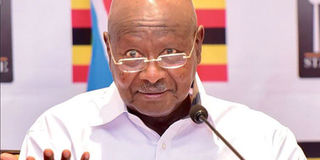President tells all telecoms to list on stock exchange

President Museveni
What you need to know:
- The value of mobile money transactions has tremendously increased in the recent years. With the advent of mobile money and its latest developments (like MTN’s Mo-Kash), telecom companies have increasingly become the leading deposit takers and money remitters.
- By July 2018, the total volume of transaction through mobile money platforms had hit Shs63 trillion. However, after the introduction of mobile money tax, it took a knock of about 50 per cent reduction from the daily Shs100b transaction to about Shs50b daily.
Kampala. President Museveni has once again demanded that all telecom operators in the country publicly list on stoke exchange so that Ugandans can own shares in the companies.
The President, while inaugurating the national expert team on fourth industrial revolution, on Monday reiterated his stance, saying telecom operators are fleecing the country by repatriating capital out of the country.
“These mobile phone companies if you are not careful they can become a serious haemorrhage to Africa. These telecom companies accumulate a lot of local shillings, then they walk to forex bureaus and buy all the dollars which we earn from other products and take away all the money and you find the Uganda Shilling going down.”
According to the President, the only way this can stop is when part of the firms are owned by Ugandans because some money will be paid to Ugandans that will be kept within the economy, thereby stabilising the Shilling.
He said Africans have long been subjected to supporting capitalism without much benefits, which must end.
The national broadband policy demands that all the telecom companies offer 30 per cent of shares to Ugandans or East Africans. As of 2017, Uganda had a total of 23,608,610 telecom subscribers, according to data from UCC’s Postal, Broadcasting and Telecommunications Annual Market & Industry Report 2016/17. The numbers have since increased.
The policy says as a first step, the telecom companies should get established as public companies and then offer 30 per cent of their shares to the public through a primary offer that is ring-fenced to Ugandan/East African nationals and institutions.
This, the policy says, will lead to increased tax collection due to the improved transparency in public financial reporting standards that are a prerequisite for listing on the bourse.
“Two of Uganda’s top six taxpayers in 2015/2016 were telecom firms so their contribution to the national treasury is very significant,” it says.
The policy also says listing of telecom company shares will reduce the downward pressure on the local shilling as the demand for dollars since part of the dividends will be paid to local shareholders, hence strengthening Uganda’s current account position.
It argues that increased investment opportunities for the rapidly growing national savings held by individuals and institutions like pension funds and other retirement benefits schemes within the country, more Ugandans will hold shares in the newly listed telecom firms and benefit from the distribution of profits –improving wealth distribution and social welfare.
Mobile money transactions
The value of mobile money transactions has tremendously increased in the recent years. With the advent of mobile money and its latest developments (like MTN’s Mo-Kash), telecom companies have increasingly become the leading deposit takers and money remitters. By July 2018, the total volume of transaction through mobile money platforms had hit Shs63 trillion. However, after the introduction of mobile money tax, it took a knock of about 50 per cent reduction from the daily Shs100b transaction to about Shs50b daily.
Mr Gordian Kyomukama, the acting chief executive officer of MTN Uganda, said as a company, they will listen to the guidance from the government on how to go about the listing.
Other mobile telephone companies are yet to respond to the directives from the President. They had not responded to our inquiries by press time.




